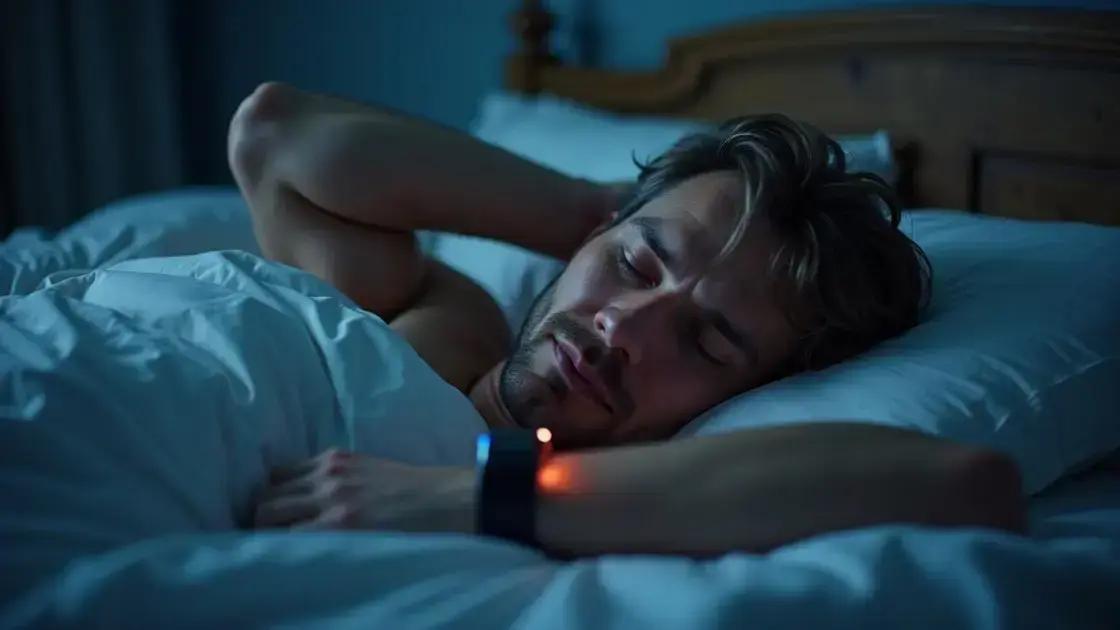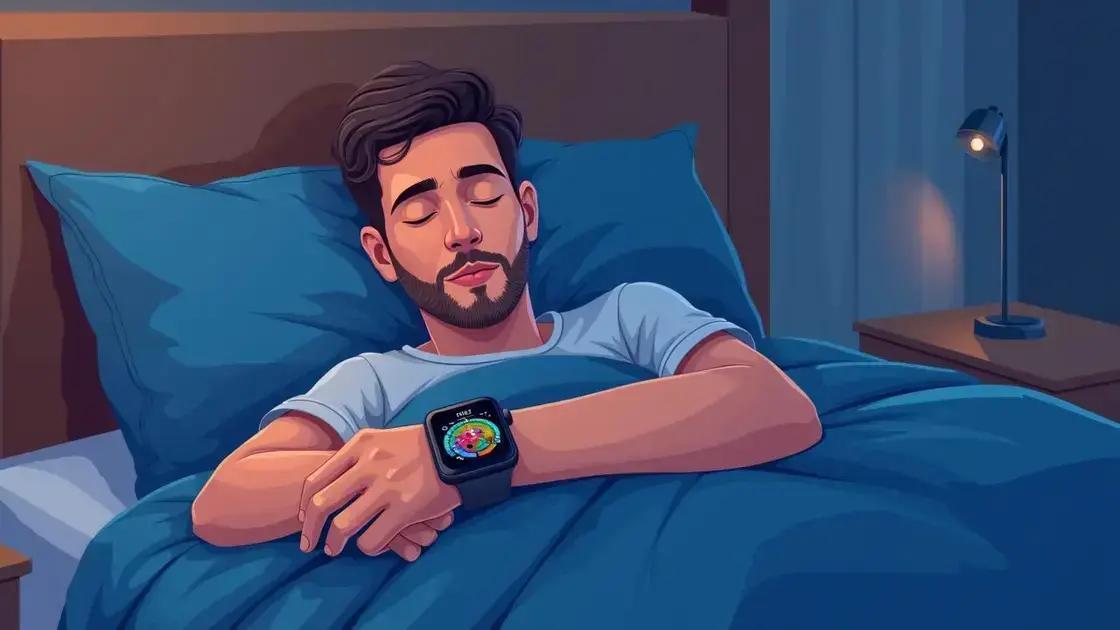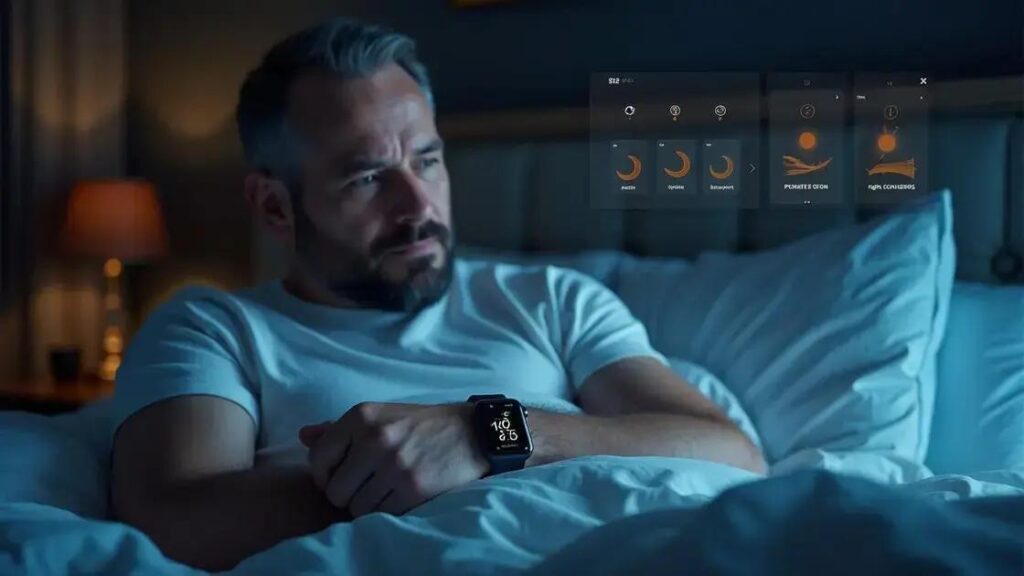Wearable devices are improving sleep quality for men over 50 by tracking sleep patterns, providing insights into health, setting sleep goals, and offering personalized recommendations for better rest.
As men age, sleep quality tends to decline, leading to various health issues. Understanding how wearable devices are improving sleep quality for men over 50 is essential for better health and well-being. These innovative tools monitor sleep patterns and provide insights that can lead to more restful nights. In this post, we will explore the role of these devices, the benefits they offer, and practical tips for leveraging technology to enhance sleep.
Understanding Sleep Quality for Men Over 50

As men age, understanding sleep quality becomes even more important. For men over 50, sleep issues can be common due to various factors such as health changes, stress, and lifestyle. Sleep quality refers to how well you sleep, including how long and how deeply you rest. Poor sleep quality can lead to fatigue, irritability, and can negatively impact daily activities.
What Affects Sleep Quality?
Several factors can affect sleep quality for men in this age group. Health conditions such as sleep apnea, arthritis, and cardiovascular issues can disrupt sleep. Additionally, medications taken for these conditions might also have side effects that hinder a good night’s rest. Stress and anxiety related to work, finances, or family responsibilities can further worsen sleep problems.
Importance of Good Sleep Quality
Maintaining good sleep quality is essential for overall health. Quality sleep improves mood, enhances cognitive function, and boosts the immune system. It is vital for recovery and repair of the body, helping to manage weight and reducing risks for chronic diseases. Understanding sleep cycles, such as REM and deep sleep, can help men over 50 recognize the phases of restful sleep they may be missing.
Measuring Sleep Quality
Measuring sleep quality can be done through several methods, including sleep diaries, questionnaires, and more recently, wearable devices. These tools provide insights into sleep patterns and highlight issues like insomnia or excessive wakefulness. This data can be crucial for addressing sleep problems effectively.
The Role of Wearable Devices in Sleep Monitoring

Wearable devices have become valuable tools for men over 50 who want to improve their sleep quality. These devices track sleep patterns and monitor various factors influencing sleep. They provide data on sleep duration, interruptions, and the stages of sleep, such as light, deep, and REM sleep.
How Wearable Devices Work
Wearable devices typically use sensors to collect data. They may monitor heart rate, movement, and body temperature during the night. This information is then used to create a picture of your sleep quality. Many devices connect with smartphone apps to share this data in easily understandable formats.
Benefits of Sleep Tracking
Tracking your sleep can lead to better decisions regarding your health. With accurate data, men can identify patterns and determine what lifestyle changes can enhance their sleep. For instance, the data may reveal that late-night screen time is impacting sleep.
Setting Goals with Data
Once you gather data, it becomes possible to set achievable sleep goals. Many wearable devices offer customized recommendations based on your sleep habits. For example, they might suggest going to bed earlier or adjusting your sleeping environment to create better conditions for rest.
Benefits of Enhanced Sleep Quality

Enhancing sleep quality brings numerous benefits for men over 50. Improved sleep can lead to better physical health. With more rest, the body can heal and repair itself, reducing the risk of chronic diseases. Quality sleep also supports heart health and helps regulate hormones.
Mental Health Benefits
Good sleep is vital for mental well-being. It can reduce stress, anxiety, and symptoms of depression. Men who sleep well usually experience brighter moods and better emotional stability. This leads to greater overall satisfaction in life.
Increased Energy and Productivity
Restful sleep helps boost energy levels and focus during the day. Men over 50 often find that they are more productive at work and have the energy for daily tasks when they sleep well. This can enhance their overall quality of life.
Enhanced Cognitive Function
Quality sleep is linked to improved cognitive performance. A well-rested brain is more effective at problem-solving and decision-making. This is especially beneficial for those in professional environments or managing personal responsibilities.
Tips for Better Sleep Using Wearable Technology

To achieve better sleep using wearable technology, men over 50 can follow these practical tips. Wearable devices offer various features that can enhance sleep quality when used correctly.
1. Set Regular Sleep Goals
Many wearable devices allow you to set personalized sleep goals. Aim for 7 to 9 hours of sleep each night. Use your device to remind you when to wind down for bed.
2. Monitor Sleep Patterns
Check the sleep data your device tracks. Look for patterns over time that show how different activities affect your sleep. Recognizing these trends can help you change habits for better rest.
3. Create a Bedtime Routine
Wearable technology can assist in establishing a calming bedtime routine. Set reminders to turn off screens and limit caffeine intake before bed. Developing a consistency can signal your body it’s time to sleep.
4. Use Sleep Environment Features
Some devices offer features that optimize your sleep environment. For instance, track room temperature or noise levels to ensure a comfortable ambiance for sleeping.
5. Stay Active During the Day
Daily activity contributes to better sleep. Many devices track physical activity. Aim for regular exercise, but avoid vigorous workouts close to bedtime, as this can disrupt sleep.
In Summary, How Wearable Devices Transform Sleep Quality
Wearable devices play a crucial role in improving sleep quality for men over 50. By understanding sleep patterns and utilizing technology effectively, men can achieve better rest and enhance their overall health.
From tracking sleep data to setting personalized goals, these devices offer practical solutions to address sleep issues. Improved sleep quality leads to numerous benefits, including better physical health, enhanced mental well-being, and increased productivity.
Following simple tips for using wearable technology can help men make positive changes in their sleep habits. By prioritizing good sleep and leveraging the right tools, it is possible to enjoy restful nights and energetic days.
FAQ – Frequently Asked Questions about Wearable Devices and Sleep Quality
How do wearable devices improve sleep quality for men over 50?
Wearable devices track sleep patterns and provide insights into sleep quality, helping users make informed changes to their sleep habits.
What factors affect sleep quality in men over 50?
Health conditions, stress, and lifestyle changes can impact sleep quality in older men, making it important to monitor these aspects.
Can wearable devices help identify sleep problems?
Yes, many wearable devices monitor sleep stages and interruptions, helping users recognize potential sleep disorders.
What are some tips for using wearable technology to improve sleep?
Set sleep goals, monitor sleep patterns, create a bedtime routine, optimize your sleep environment, and stay active during the day.
Are there specific features to look for in a sleep tracking device?
Look for devices that offer heart rate monitoring, sleep stage tracking, and insights into your sleep environment for effective analysis.
How does improved sleep quality benefit overall health?
Enhanced sleep quality can lead to better physical health, improved mental well-being, increased productivity, and enhanced cognitive function.












